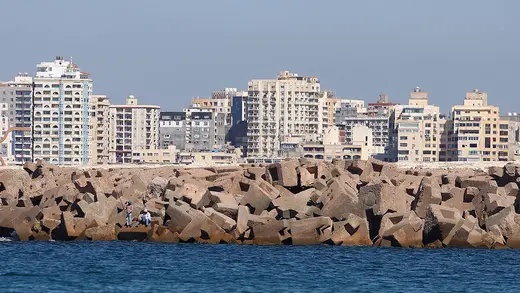With Egypt hosting this year’s UN climate summit, the twenty-seventh Conference of the Parties (COP27), Cairo has positioned itself as Africa’s climate leader and aims to secure funds to help developing countries’ adaptation efforts. But as the country prepares the resort city of Sharm el-Sheikh for the November summit, some critics question whether Egypt can be a leader on climate action while it continues to stifle civil society and rely on fossil fuels.
Why is COP27 important for Egypt and the rest of Africa?
COP summits have been the premier global forum for climate negotiations since 1995 and produced the 2015 Paris Agreement, which aims to prevent the global average temperature from rising 1.5°C (2.7°F) above preindustrial levels. Egyptian President Abdel Fatah al-Sisi says Egypt will use its role as host to advocate for the interests of African and other developing nations. Despite contributing relatively little to global greenhouse gas emissions, developing countries are among the hardest hit as climate change exacerbates food insecurity, water scarcity, and extreme heat, among other problems, and experts warn that they lack the resources to adapt on their own.
Cairo appears to have organized COP27 around the goal of increasing climate finance, or investment in efforts to adapt to the consequences of climate change and mitigate greenhouse gas emissions, climate expert Karim Elgendy says. This would largely mean implementing commitments already pledged in previous talks. Of particular concern is the $100 billion in annual funding that wealthy governments agreed to provide low-income countries via the Green Climate Fund, a target they missed by more than $16 billion in 2020.
What has Egypt done so far on climate?
More on:
Egypt has undertaken some major mitigation efforts over the past two decades, such as increasing its wind energy capacity fivefold. It has also pursued adaptation initiatives, including the construction of desalination plants and flood-prevention infrastructure to cope with worsening water stress. It was the first government among Middle Eastern and North African countries to issue green bonds, directing $750 million toward clean public transport and sustainable water management. Since being named COP27 host about a year ago Egypt has announced a raft of climate-related projects, including plans to transform tourist hotspot Sharm el-Sheikh into a “green city.”

Ahmed Gomaa/Xinhua/Getty Images
However, independent climate watchdogs such as the Climate Change Performance Index and the Climate Action Tracker call the country’s overall climate policy opaque and unambitious. Part of the problem is a heavy reliance on natural gas and other fossil fuels, which accounted for about 90 percent of its power generation capacity in 2019. Cairo seeks to increase the country’s oil and natural gas production and is among lower-income countries that argue they should be able to economically develop with fossil fuels until they can afford to transition to clean energy.
What are the concerns over Egypt hosting?
Analysts warn that Egypt’s fossil fuel dependence could undermine its climate leadership at COP27. Critics also accuse Egypt of intentionally overselling its eco-friendly attitude, a practice known as “greenwashing,” to distract from its poor human rights record. Amnesty International argues that Cairo is using the summit as a “rebranding exercise” to deflect criticism of its authoritarian crackdown, which has included blocking independent news outlets and jailing thousands of journalists, protesters, and activists since 2013. Though street protests are illegal, the government will allow demonstrations at a space adjacent to the climate conference. Still, it’s unlikely that protests at COP27 will resemble the high-profile demonstrations that have occurred at past conferences. However, some Egyptian activists hope the heightened attention on Egypt will push the government to loosen its grip on civil society.
Other critics are unimpressed by Egypt’s lack of interest in lowering emissions. By the Paris Agreement timeline, Cairo was more than a year late in updating its nationally determined contribution (NDC) [PDF], a country’s voluntary plan for reducing its own emissions. Egypt’s new NDC is contingent on international support, and like many other countries, it lacks a quantifiable target for reaching net-zero emissions. Furthermore, in its 2022 National Climate Change Strategy [PDF], Cairo focuses on adaptation rather than reducing emissions.
What comes next?
The World This Week
A weekly digest of the latest from CFR on the biggest foreign policy stories of the week, featuring briefs, opinions, and explainers. Every Friday.
Egypt and other African exporters will likely remain hesitant to reduce production of natural gas, especially as European countries seek alternatives to Russian gas amid the war in Ukraine. Egypt already signed a new gas delivery deal with the European Union and Israel, and officials have said Egypt will only set a net-zero target if it gets more financial assistance. This reluctance to commit to emissions reduction suggests a continued focus on climate finance Elgendy says. Still, he says, “all climate action is welcome as a step forward.”
More on:
In Brief
Egypt Is Hosting COP27. Can It Become Africa’s Climate Champion?
September 8, 2022 9:13 am (EST)
As host of the UN climate talks, Egypt is trying to attract financial support for the continent’s climate actions. But its record of repression and reliance on fossil fuels threaten to undercut that effort.
With Egypt hosting this year’s UN climate summit, the twenty-seventh Conference of the Parties (COP27), Cairo has positioned itself as Africa’s climate leader and aims to secure funds to help developing countries’ adaptation efforts. But as the country prepares the resort city of Sharm el-Sheikh for the November summit, some critics question whether Egypt can be a leader on climate action while it continues to stifle civil society and rely on fossil fuels.
Why is COP27 important for Egypt and the rest of Africa?
COP summits have been the premier global forum for climate negotiations since 1995 and produced the 2015 Paris Agreement, which aims to prevent the global average temperature from rising 1.5°C (2.7°F) above preindustrial levels. Egyptian President Abdel Fatah al-Sisi says Egypt will use its role as host to advocate for the interests of African and other developing nations. Despite contributing relatively little to global greenhouse gas emissions, developing countries are among the hardest hit as climate change exacerbates food insecurity, water scarcity, and extreme heat, among other problems, and experts warn that they lack the resources to adapt on their own.
Cairo appears to have organized COP27 around the goal of increasing climate finance, or investment in efforts to adapt to the consequences of climate change and mitigate greenhouse gas emissions, climate expert Karim Elgendy says. This would largely mean implementing commitments already pledged in previous talks. Of particular concern is the $100 billion in annual funding that wealthy governments agreed to provide low-income countries via the Green Climate Fund, a target they missed by more than $16 billion in 2020.
What has Egypt done so far on climate?
More on:
Egypt has undertaken some major mitigation efforts over the past two decades, such as increasing its wind energy capacity fivefold. It has also pursued adaptation initiatives, including the construction of desalination plants and flood-prevention infrastructure to cope with worsening water stress. It was the first government among Middle Eastern and North African countries to issue green bonds, directing $750 million toward clean public transport and sustainable water management. Since being named COP27 host about a year ago Egypt has announced a raft of climate-related projects, including plans to transform tourist hotspot Sharm el-Sheikh into a “green city.”

Ahmed Gomaa/Xinhua/Getty Images
However, independent climate watchdogs such as the Climate Change Performance Index and the Climate Action Tracker call the country’s overall climate policy opaque and unambitious. Part of the problem is a heavy reliance on natural gas and other fossil fuels, which accounted for about 90 percent of its power generation capacity in 2019. Cairo seeks to increase the country’s oil and natural gas production and is among lower-income countries that argue they should be able to economically develop with fossil fuels until they can afford to transition to clean energy.
RelatedPost
What are the concerns over Egypt hosting?
Analysts warn that Egypt’s fossil fuel dependence could undermine its climate leadership at COP27. Critics also accuse Egypt of intentionally overselling its eco-friendly attitude, a practice known as “greenwashing,” to distract from its poor human rights record. Amnesty International argues that Cairo is using the summit as a “rebranding exercise” to deflect criticism of its authoritarian crackdown, which has included blocking independent news outlets and jailing thousands of journalists, protesters, and activists since 2013. Though street protests are illegal, the government will allow demonstrations at a space adjacent to the climate conference. Still, it’s unlikely that protests at COP27 will resemble the high-profile demonstrations that have occurred at past conferences. However, some Egyptian activists hope the heightened attention on Egypt will push the government to loosen its grip on civil society.
Other critics are unimpressed by Egypt’s lack of interest in lowering emissions. By the Paris Agreement timeline, Cairo was more than a year late in updating its nationally determined contribution (NDC) [PDF], a country’s voluntary plan for reducing its own emissions. Egypt’s new NDC is contingent on international support, and like many other countries, it lacks a quantifiable target for reaching net-zero emissions. Furthermore, in its 2022 National Climate Change Strategy [PDF], Cairo focuses on adaptation rather than reducing emissions.
What comes next?
The World This Week
A weekly digest of the latest from CFR on the biggest foreign policy stories of the week, featuring briefs, opinions, and explainers. Every Friday.
Egypt and other African exporters will likely remain hesitant to reduce production of natural gas, especially as European countries seek alternatives to Russian gas amid the war in Ukraine. Egypt already signed a new gas delivery deal with the European Union and Israel, and officials have said Egypt will only set a net-zero target if it gets more financial assistance. This reluctance to commit to emissions reduction suggests a continued focus on climate finance Elgendy says. Still, he says, “all climate action is welcome as a step forward.”
More on:













































